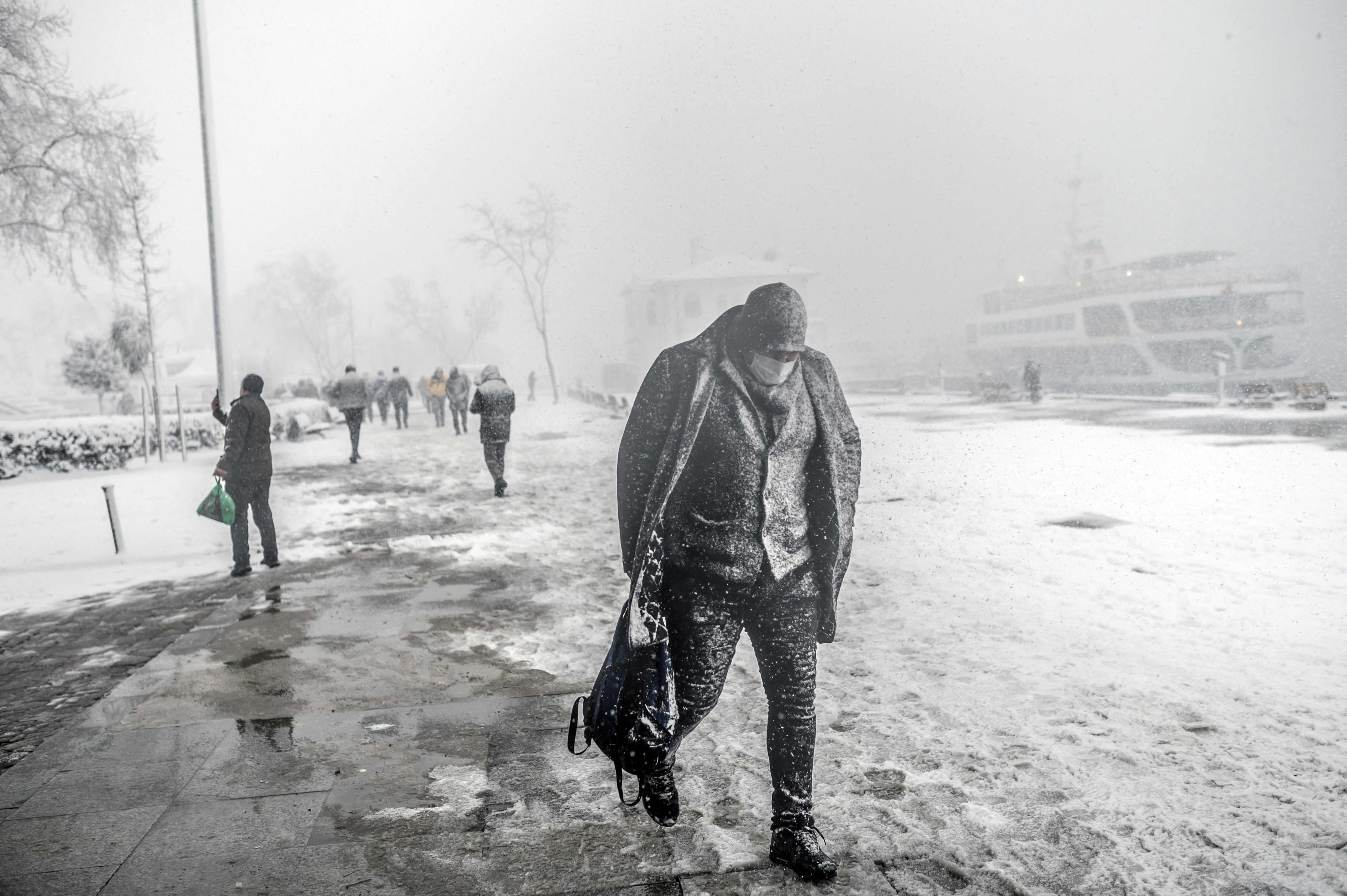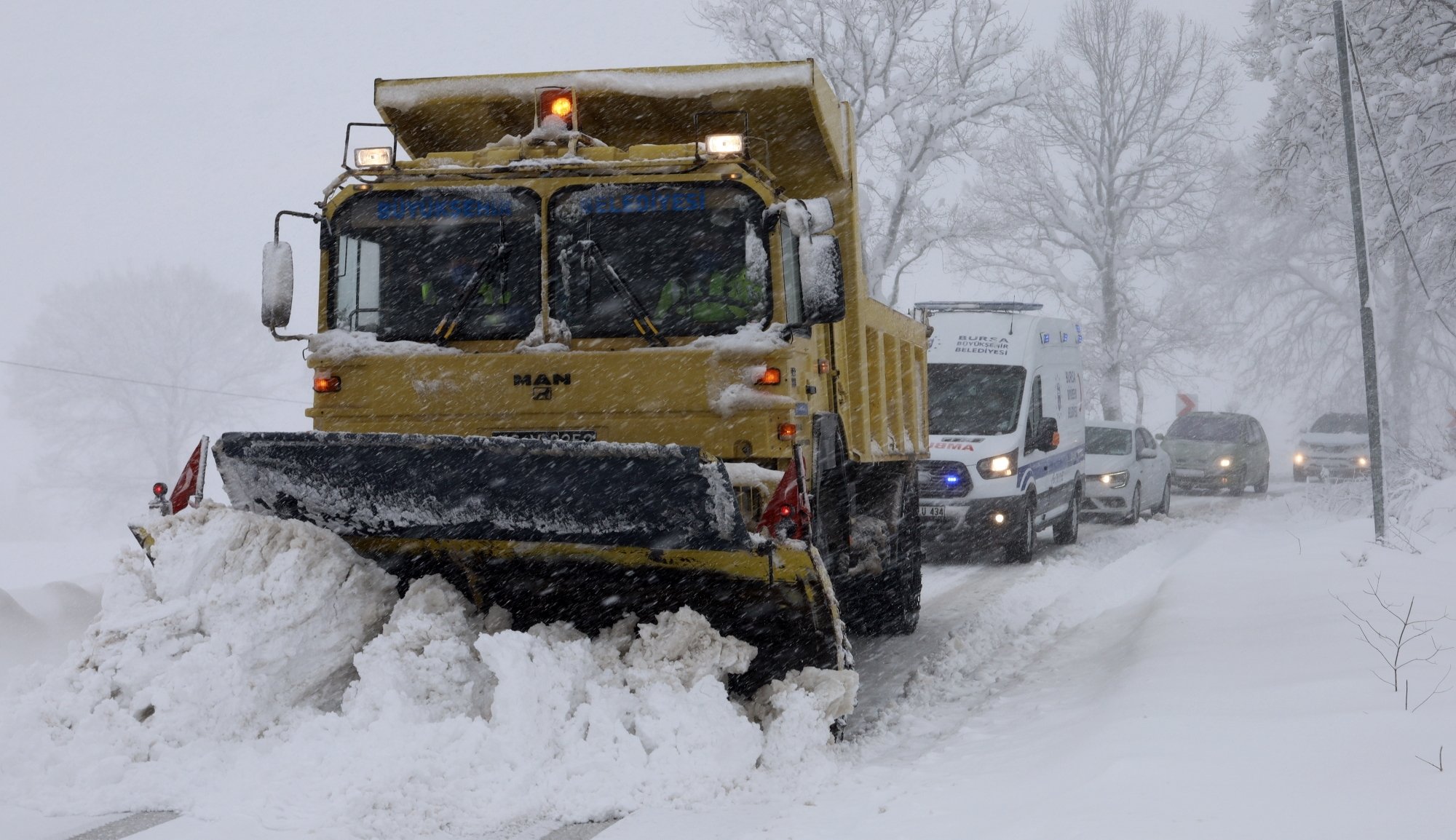© Turkuvaz Haberleşme ve Yayıncılık 2026
From Istanbul to Turkey's eastern provinces, harsh winter conditions gripped the country on Wednesday. Snowfall, blizzards and strong winds led to traffic accidents and closure of roads while toppling trees and tearing apart roofs of buildings.
The Turkish State Meteorogical Service (TSMS) issued “yellow” and “orange” alerts, which require utmost caution, over bad weather in 69 cities. Authorities announced that in-person education, which was resumed on Monday for rural schools after months of closure due to coronavirus pandemic, was switched back online in 24 provinces due to snowfall.
Weather forecasts show mostly cloudy weather for some regions while most places, from the Marmara region to southeastern Anatolia, will be affected by precipitation at least until Thursday.
Densely populated Istanbul was among the cities hit hardest by the snowfall, which started last Saturday and sporadically continued into Wednesday. Traffic jams were worst on Wednesday on a stretch of the TransEuropean Motorway (TEM) straddling through the city. Motorists were stranded for hours in their vehicles while crews worked to clear the road with snowplows.

In Kağıthane, a high-altitude district on the city’s European side, morning rush hour traffic came to a halt due to snowfall.
Elsewhere, commuters in buses stuck in traffic disembarked vehicles to walk on foot to work.
Snowfall and blizzards also led to a decline, to 10 meters, in visibility, further slowing down traffic, particularly on Fatih Sultan Mehmet Bridge that connects two sides of Istanbul separated by the Bosporus.
Traffic accidents were reported across the city as vehicles drifted on icy streets though there were no casualties.
Istanbul will warm back up this weekend, with temperatures rising up to 10 degrees Celsius (50 Fahrenheit) from current levels fluctuating around zero Celsius. Snowfall is expected to end on Thursday.
Meanwhile, a major road connecting the city to western regions was reopened for traffic after two days of snowfall stranded drivers until late Tuesday. Disruption to traffic was reported again, however, on another section of the road in Bursa province after a four-car pileup.
Meteorology experts say the snowfall is a result of what they termed “sea-effect snow” that involves a cold air mass moving across large bodies of water. Sea-effect snow forms when a lower layer of air, warmed due to sea temperatures picks up vapor from the sea and takes it to the colder air on higher layers, where it evolves into snowfall.
Elsewhere, 1,071 settlements, mostly villages, had access to other residential areas cut off because of snow in central provinces Kayseri, Sivas and Kırşehir. In Kayseri, roads connecting districts to central provinces were shut down by snowfall. Local governorates deployed snowplows to clear the roads, but ongoing precipitation remained a challenge to keep the roads open. Authorities warn drivers not to travel unless necessary. Trucks were not allowed on a road connecting Sivas to Tokat province while police squads delivered food and hot drinks to drivers who were ordered to wait at a gas station in Tokat.

In the central and eastern parts of the Black Sea region in the north, roads to 1,644 residential areas in seven provinces were closed. Power outages were reported in many rural neighborhoods due to bad weather. Crews clearing the roads prioritize villages where people with medical emergencies live.
The Mediterranean province of Antalya, known for year-round warm weather apart from occasional rainfall, was also hit by snowfall. The precipitation that started late Tuesday worsened on Wednesday, almost shutting down roads to residential areas on higher grounds. Konyaaltı district was particularly affected, where motorists stranded on roads were evacuated by municipality crews.
